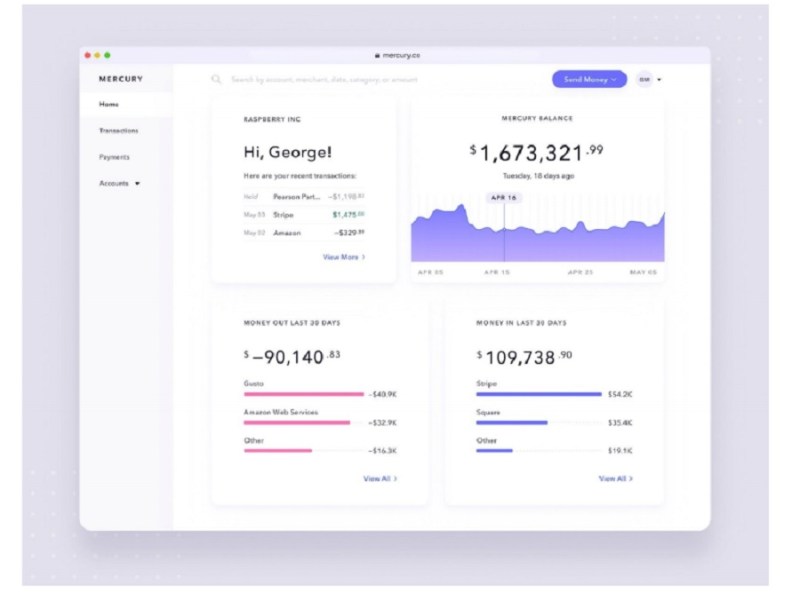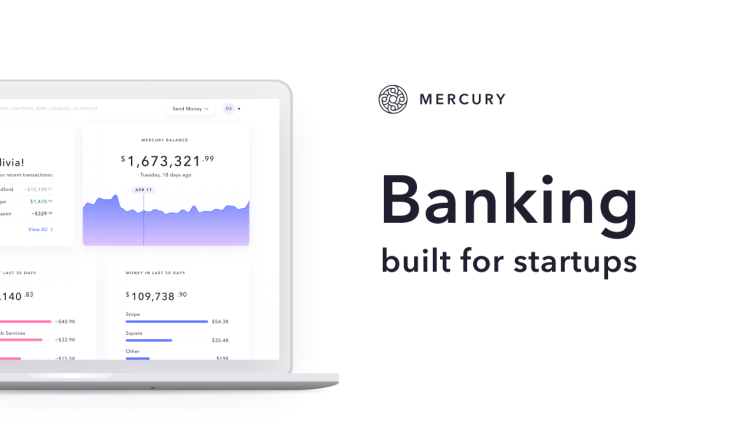Mercury, a San Francisco-based firm offering banking services tailored to the needs of startups, today announced that it’s raised $20 million in series A funding led by Charles River Ventures, with participation from existing investor Andreessen Horowitz and individual investors Eventbrite CEO Kevin Hartz, NBA players Andre Iguodala and Kevin Durant, and others. It brings Mercury‘s total raised to nearly $30 million following a $6 million seed round in August 2017, and it comes after the company signed on 1,500 new customers in April 2019 — the month of its public launch — and notched 40% growth each month after.
“We’ve created a really powerful, efficient banking experience. Now, we want to do things beyond what people think of banks as doing,” said CEO Immad Akhund, who with cofounders Max Tagher and Jason Zhang was inspired to start Mercury after encountering payment challenges at previous startups. “If our bank back then had an API, we would’ve saved days of manual work, stress, and frustration every month. We don’t want any startup to have to experience that ever again.”
Most U.S.-based bootstrapped and funded startups are eligible to sign up with Mercury, with the exception of those operating money services businesses or involved with adult entertainment, marijuana, or internet gambling. Mercury’s FDIC-insured checking and savings accounts are provided through BBVA and Memphis-based Evolve Bank & Trust, and they earn up to 1.75% interest on average.

Above: Mercury is a bank that targets tech startups.
Accounts can be managed from an online dashboard featuring cashflow analytics, automatic payments, instant runway estimates, and other tools. They’re secured with two-factor authentication and full activity auditing, the latter of which exposes metadata for every bookkeeper and team member login. (Bookkeepers can’t initiate money movements or change user permissions.) And they usefully block overdrafts and send notifications when funds begin to run low.
June 5th: The AI Audit in NYC
Join us next week in NYC to engage with top executive leaders, delving into strategies for auditing AI models to ensure fairness, optimal performance, and ethical compliance across diverse organizations. Secure your attendance for this exclusive invite-only event.
Meanwhile, Mercury’s API lets companies access their accounts programmatically, enabling things like transaction reconciliation, custom money sweep rules, mass payment sending, and real-time transaction monitoring. Payments can be sent via wire, check, or ACH, and every transaction remains searchable from a downloadable log. And in the near future, Mercury will integrate third-party products like Stripe and Gusto, allowing account holders to see their full financial stacks in a single view.
Mercury doesn’t require a minimum deposit or impose opening, overdraft, or transaction fees, and it’s only $5 or $35 to send a domestic or international wire, respectively. Standard savings accounts can expect to see 1% interest, while special Tea Room accounts — which require more than $250 million in checking or an invitation — earn 1.5% interest and partner rewards like complimentary tea bags (really).
Rivals include incumbents like Silicon Valley Bank and Wells Fargo. But Mercury has already managed to attract clients including Tandem, which recently raised $7.5 million in seed funding, plus Remote, Linear, Adius, Golden, Datamode, Source, Rad AI, and Memfault.
“After working with a number of companies in my investment portfolio over the past several years, it’s clear that a banking platform such as Mercury is paramount to startup growth,” said Iguodala. “Mercury provides financial tools to maximize efficiency and allow for more visibility within the business. I’m excited to be a part of such a movement in hopes it will continue to bring more startups to the forefront.”
Other investors in Mercury’s series A include the Cultural Leadership Fund, Clocktower Ventures, Liquid2 Ventures, 500 Fintech, and Melo7 Tech II. Among previous investors are AngelList CEO Naval Ravikant, Gusto CEO Josh Reeves, Elad Gil, Atrium CEO Justin Kan, and Roger Smith.


